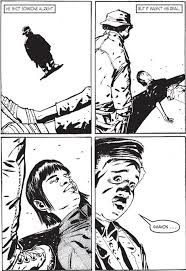In the graphic novel Yummy by G. Neri, the course of events that end a young boy's life are recounted. Robert Sandifer, also known as "Yummy," was 11 years old when he met his end. The story of Yummy and his gang affiliations that ended in his accidental shooting of a young girl and his own eventual death by two members of the very gang that claimed him was made even more real to me when I saw the above photo. This was the cover of Time magazine that featured Yummy and his story, highlighting Yummy's age and situation. He is described as having a "short, violent life." Was Yummy a little monster, bent on using whatever means necessary to get what he wanted or was he a misunderstood child who did not possess the ability to make good choices?
The above panel shows the innocence that I believe redeems Yummy as an individual. He has just shot into a crowd of people and hits who he thinks is his rival. It turns out that he has instead missed and killed a young girl named Sharon. The last panel on this page shows Yummy's wide eyes and really portrays his adolescence and naivety at what he has gotten himself into.
This panel really made me feel for Yummy. He has been running and hiding on his own, but he finally breaks down and calls his granny to come pick him up. He reacts like any 11-year-old boy would. He says, "it weren't my fault," but his inability to grasp what he has done and his responsibility for it is just a product of his youth. Yummy just wants to feel safe again.
Robert Sandifer was just a boy. He was a boy who loved sweets and slept with a teddy bear. He was also a boy who wanted to be in with the cool kids. How many of us can say that we have not done something wrong in order to impress someone else? What Yummy did was wrong, and he deserved punishment. However, he did not deserve to be shot and killed like a hunted animal. In the end, Yummy's redeeming qualities were not enough to outweigh his detrimental qualities. Yummy's last gift to all young people is a warning to not live the "short, violent life" that he did.







